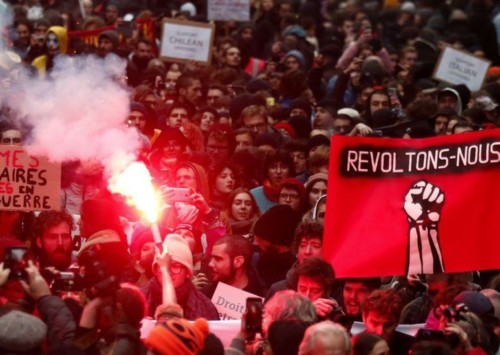Russia-Ukraine repair relations

Russian President Vladimir Putin, Ukrainian President Volodymyr Zelenskiy, Germany’s Angela Merkel and French President Emmanuel Macron came together for the first top-level summit on the Ukraine conflict in three years
The quartet meeting in Paris earlier this week saw Russia and Ukraine take moves to reduce tensions. This would allow Russia to rebuild strained ties with Germany and France and talk business.
Numerous sighs of immense relief must have been simultaneously exhaled across Europe earlier this week when leaders of four nations – France, Germany, Russia and Ukraine – finally sat across the table to discuss reducing tensions between Moscow and Kiev after over five years of skirmishes between the two militaries and a civil war in eastern Ukraine that has claimed over 13,000 lives.
This was the first meeting between Russian President Vladimir Putin, who has been in power for over two decades and the Ukrainian President Volodymyr Zelensky who was elected a few months earlier. The meeting was hosted by French President Emmanuel Macron at his Elysées Palace in Paris, with German chancellor Angela Merkel in attendance.
After setting the tone for the meeting, the two EU leaders left Putin and Zelensky to continue their bilateral talks and try to reach an agreement that could signal the end of the tension between the two nations. At the heart of the conflict is the status of Crimea, a former Ukrainian province which agreed to merge with Russia following a referendum that was passed with a large majority, as well as parts of Eastern Ukraine, notably the Donbas region, where Russian-speaking separatists have been fighting for independence since 2014. Ukraine and the West have accused Russia of being behind both the Crimean move as well as the fighting in Donbas, though Russia denies any involvement.
Ties between the two former members of the Soviet Union have been at their worst since the breakup of the USSR, with Russia frequently threatening and actually carrying out disruptions in supply of gas to Ukraine, which depends significantly on the Russian gas to warm its homes and run its economy.
The military stand-off has not helped either country as both the economies have been suffering and economically Russia has been really hit hard by the sanctions, mainly those imposed by the United States and the EU. According to reports, the Russian economy has shrunk by nearly 10 pc since 2014, thanks in equal measures to the sanctions imposed on Russia and lower oil prices. The sanctions have dried up foreign investors that had been very active in Russia for many years before the sanctions were imposed.
Thus the meeting in Paris was crucial as both Ukraine and Russia emerged stronger from it. Both the countries have agreed to push back their forces further apart, in the Donbas region, in order to reduce tensions and also work towards holding local elections there as the first step to decide the future of the contested territory. The two countries have already had a prisoner swap in the days leading upto the Paris meeting.
Russia would certainly be now looking at easing of the sanctions, while Ukraine can perhaps take its overstretched military off the high-alert state that it has been over the past five years. Kiev can also hope to look towards progress in normalisation of ties with Moscow. But it is not just these two protagonists that walk away happier from the Elysées meeting. Germany has been keen on moving faster on the construction of the controversial but crucial Nord Stream 2 project which will open a pipeline to supply Russian gas directly to Germany, by-passing Ukraine. The 1,230 km long pipeline can carry a total of 55 billion cubic metres of gas a year and is nearing completion.
For Germany it would have been politically challenging to move ahead normally with Nord Stream 2, while the rest of the EU was imposing fresh sanctions against Russia. However, with the easing of the tensions, it is likely that Merkel will be able to ensure that the Nord Stream 2 comes online rapidly, within a few weeks and a reliable supply of large quantities of cleaner fuel is available to Germany in order for the country to sharply cut its carbon footprint and meet its obligations under the Paris Agreement of climate change.
For France, too, normalisation of ties with Moscow will open up new streams of collaboration and perhaps even revive some of the earlier ones, notably the Russian purchase of French defence equipment like the Mistral amphibious assault frigates.










